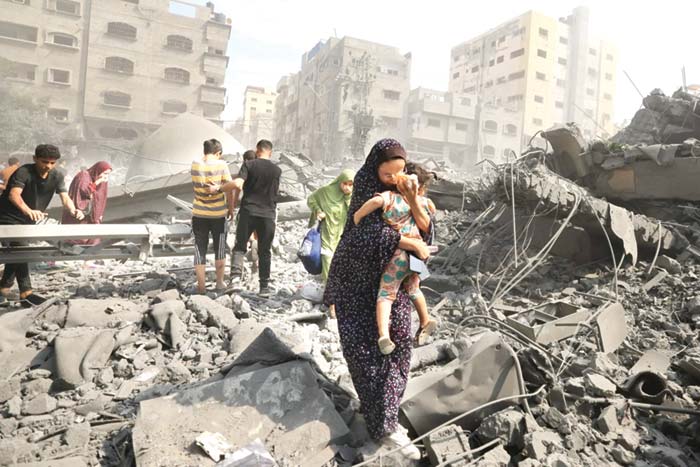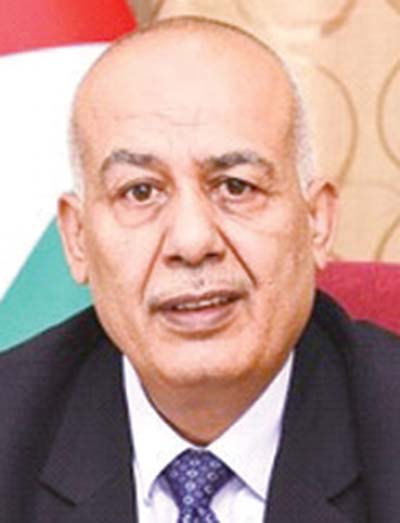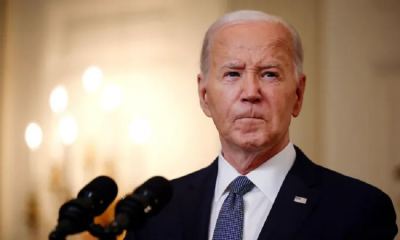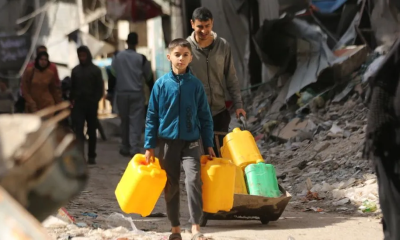Features
Did Hamas Brutality Revive Bibi’s Politics?

by Nilantha Ilangamuwa
Absolutely nothing can justify any form of violence, whether it’s physical or psychological. Paradoxically, violence has been a tool used not just by humans, but by all living beings throughout history to assert dominance over the vulnerable. The chronic crisis initiated by British colonialists in Palestine, who arbitrarily granted statehood to create Israel based on biblical mythologies and political schism, without regard for ground realities and people’s sentiments, exemplifies the brutality that has scarred human civilization. Israel was born in war, has perpetually lived in war, and appears destined to end in war. The word ‘peace’ may exist in their language, but it remains a distant mirage.
What we witness in Israel is not new, but the recent attack launched by Hamas, a designated terrorist entity, yet one that managed to secure the people’s mandate through free and fair elections, was different in nature and approach. However, while Operation Al-Aqsa Flood, as Hamas dubbed it for purposes of their extensive public relations campaign, may have achieved some success, it’s clear that war will never bring an end to this multifaceted and exceedingly complicated conflict in the modern history of human civilization.
What truly matters is the timing of this attack. Historically, it occurred just a day after the 50th anniversary of the Yom Kippur War. More importantly, it unfolded against the backdrop of a deepening political quagmire within the Israeli government. Prime Minister Benjamin Netanyahu, commonly known as Bibi, who made a surprising comeback after a humiliating defeat, was steadily losing his political grip to other parties, presiding over an ultra-nationalistic and unstable political landscape. Recent judicial reforms, including the abolishing of the “reasonableness doctrine” to grant the head of state the power to appoint individuals with previous convictions of bribery, fraud, breach of trust, money laundering, and various tax offenses, only added fuel to the fire.
This prompted thousands of people to take to the streets in protest against the government. Even some senior officials within Israel’s top-secret agency, Mossad, voiced their discontent. Netanyahu’s confidante and former Mossad chief, Yossi Cohen, publicly called for the government to cease the judicial overhaul and return to negotiations, citing an immediate threat to national security. Simultaneously, leaders of the Brothers in Arms protest group announced at a press conference that approximately 10,000 reservists had pledged not to volunteer for duty if the overhaul legislation passed.
The unfolding internal crisis within Netanyahu’s government is nothing short of ominous and unmanageable. Given this political context, it would be no surprise if numerous conspiracy theories emerge in the days ahead, suggesting that Bibi, with prior knowledge of the impending attacks, allowed them to occur with the aim of restoring his political power. Indeed, this attack catapulted Bibi to the status of a savior in the country’s emerging new normal overnight.

Dr. Zuhair M.H. Zaid, the Ambassador for Palestine in Sri Lanka, shared his perspective on the ongoing conflict in the country with this writer from Gaza, Palestine
However, what is truly astonishing is that Hamas’s surprise assault not only revitalized the Israeli government’s grip on power but also galvanized society at large, rallying behind Netanyahu’s resolve to decimate Gaza in the name of eliminating Hamas. The Defense Minister’s orders to impose a total blockade on Gaza Strip have set in motion the all-too-familiar pattern of hunting ‘enemies’ at the cost of countless civilian lives. Basic necessities such as electricity, water, and food have been mercilessly cut off.
This marks just the beginning of what may well evolve into a conflict reminiscent of the Six-Day War. In the end, not only will the humanitarian crisis escalate, but a significant portion, if not the entirety, of Gaza may fall into Israeli hands to fuel the expansion of settlements. Yet, history teaches us that sowing the seeds of terrorism by creating conditions ripe for extremism will never lead to the defeat of terrorism. If ongoing operations continue to jeopardize the gradual and steady normalization of relations between Israel and Arab countries, the Israeli administration may further risk losing its grip and revisiting a dark chapter in history.
This crisis transcends mere victory in battle; it strikes at the very core of our humanity. If Israel persists in its inability to acknowledge the historical forces that have consistently eroded the basic rights of Palestinians, no generation will ever know a peaceful night. As one of Tel Aviv’s most senior journalists, Yossi Melman, proposed during an interview with this writer, the idea of opening a ‘humanitarian corridor’ for the exchange of women and children could serve as a vital first step in this humanitarian quagmire.
In this turbulent time, let us not forget that Netanyahu has faced some of history’s most arduous battles. His brother, Yonatan Netanyahu, met a tragic end at the hands of Ugandan security forces during Operation Entebbe. In reflecting on the Yom Kippur War, Prime Minister Netanyahu reminds us that history has a way of repeating itself, and the same impulses that drove past crises may resurface in the face of this seemingly insurmountable assault on Israel’s moral authority. ‘I didn’t hear the news until late in the day on October 6, 1973. Egypt and Syria launched a surprise attack on Israel on the holiest day of the Jewish year, the Day of Atonement,’ Netanyahu wrote. When assessing the political leadership at the time, he noted, ‘Golda Meir should have known better… on the critical decision of preemption, Golda missed the mark.’
While Hamas may be the immediate target of Israel’s response, its longstanding adversaries, situated miles away from the borders—namely, Iran, Syria, and Hezbollah in Lebanon—loom large in the equation. This could explain why, just hours after Hamas’s surprise attack on Israel, Western media attempted to draw links to Iran, despite vehement denials from both Iranian authorities and the Israel Defense Forces.
In the wake of Hamas’ audacious operation, a resounding defeat suffered by Western alliances and their sophisticated technologies in Ukraine is now shifting attention towards the Israel-Palestine conflict. They find themselves in a position where they can wash their hands of an already faltering battle against Russia, potentially relegating Ukraine to a lesser priority. As a consequence, the impending autumn and approaching winter, as forecast by this writer several months ago, spell doom for the Ukrainian people.
Volodymyr Zelenskyy, if he can cast aside his preconceived notions and misplaced overconfidence in Western support, must consider initiating fresh peace talks mediated by third parties. If direct dialogue with Russia proves challenging, options such as involving China—the only country to submit a written proposal for lasting peace in the region—or the commendable efforts of a group of African nations led by Cyril Ramaphosa, the President of South Africa, could provide Ukraine with a chance to restore peace despite the worsening situation.
Numerous investigative reports have painstakingly exposed the rampant corruption plaguing Ukraine. Furthermore, a significant portion of the highly advanced weaponry supplied to Ukraine by Western nations has mysteriously ended up near the Polish border and in other vulnerable regions, where arms smugglers hold sway, redirecting them to other global conflict zones. It remains too early to confirm whether Hamas tapped into this supply chain discreetly while devising its remarkable war plan against its ‘enemy.’ However, Hamas’ tactics and strategies are showcasing a shifting landscape in this conflict, one that not only challenges Israeli technology but also demonstrates the ability to adapt to technological advancements, underscoring the fact that war can never be the ultimate path to peace.
The peril of the astonishing success of Hamas’ operations lies in the potential resurgence of Islamic fanaticism, propagated by groups like Al-Qaeda and the Islamic State. This could herald new strategic dimensions as they seek to infiltrate targets and recruit new members across the globe, potentially causing even more catastrophic mayhem.
As Chris Hedges astutely argues, what transpired in Israel is that Palestinians have learned the language of violence that Israel has taught them over generations. It once again proves that ‘the terror Israel inflicts is the terror it will receive.’ This bitter truth highlights the plight of unarmed civilians in both Israel and Palestine who pay the price for the actions of those who manipulate political and military power. Therefore, what truly matters is not the global alliance for the manufacture of war material, but the commitment to uphold equal and dignified lives for all.
***
“In the tumultuous Palestinian quest for basic rights, the international community and Western nations have perpetuated a disturbing dual standard,” Dr. Zaid stressed. “As the world looks on, we find ourselves backed into a corner, our very existence hanging in the balance. Our access to essential daily necessities has been violently severed, pushing our nation to the precipice of despair. Israel has maintained this oppressive status quo for far too long, all the while striving to normalize relations with neighboring nations.”
Dr. Zaid underscored the agonizing reality that the Palestinian population confronts daily. “We have been pushed to a point where resistance appears to be the sole recourse. Innocent civilians are caught in a dire ‘do or die’ situation. Whether through its dealings with Hamas or any other group, Israel has fostered an environment where violence becomes nearly inevitable. It is high time for Israel to heed the tenets of international law and embrace the norms of the rule of law.”
He then went on to remind the world of recent atrocities. “Just a few months ago, on July 3rd and 4th, Israeli forces initiated a large-scale operation in the Jenin refugee camp, resulting in the tragic loss of 12 Palestinians, including four children, and the injury of 143 others. This marked the highest number of Palestinian casualties in a single operation in the West Bank since 2005. Israel’s actions resound louder than its rhetoric; they expose a profound lack of genuine commitment to peace and a disconcerting propensity to manipulate the international community.”
Dr. Zaid emphasized the hypocrisy in international affairs. “The irony lies in Israel’s persistent use of brutal tactics to undermine Palestine. A cursory examination of the map reveals the extent of Israel’s occupation, defying the spirit of numerous agreements between both parties. For years, they have thwarted democratic elections, fully aware that the majority of the populace holds views contrary to theirs.”
Ambassador Zaid concluded with a question that resonates universally. “We must ask ourselves, if the international community can rally support for Ukraine in its struggle against what they consider as Russian occupation, why does a deafening silence persist when it comes to Palestine? They are supporting the Israeli occupation. Why this glaring double standard, it is a question that demands an answer, a plea for justice that reverberates across borders and transcends politics.
Features
The heart-friendly health minister

by Dr Gotabhya Ranasinghe
Senior Consultant Cardiologist
National Hospital Sri Lanka
When we sought a meeting with Hon Dr. Ramesh Pathirana, Minister of Health, he graciously cleared his busy schedule to accommodate us. Renowned for his attentive listening and deep understanding, Minister Pathirana is dedicated to advancing the health sector. His openness and transparency exemplify the qualities of an exemplary politician and minister.
Dr. Palitha Mahipala, the current Health Secretary, demonstrates both commendable enthusiasm and unwavering support. This combination of attributes makes him a highly compatible colleague for the esteemed Minister of Health.
Our discussion centered on a project that has been in the works for the past 30 years, one that no other minister had managed to advance.
Minister Pathirana, however, recognized the project’s significance and its potential to revolutionize care for heart patients.
The project involves the construction of a state-of-the-art facility at the premises of the National Hospital Colombo. The project’s location within the premises of the National Hospital underscores its importance and relevance to the healthcare infrastructure of the nation.
This facility will include a cardiology building and a tertiary care center, equipped with the latest technology to handle and treat all types of heart-related conditions and surgeries.
Securing funding was a major milestone for this initiative. Minister Pathirana successfully obtained approval for a $40 billion loan from the Asian Development Bank. With the funding in place, the foundation stone is scheduled to be laid in September this year, and construction will begin in January 2025.
This project guarantees a consistent and uninterrupted supply of stents and related medications for heart patients. As a result, patients will have timely access to essential medical supplies during their treatment and recovery. By securing these critical resources, the project aims to enhance patient outcomes, minimize treatment delays, and maintain the highest standards of cardiac care.
Upon its fruition, this monumental building will serve as a beacon of hope and healing, symbolizing the unwavering dedication to improving patient outcomes and fostering a healthier society.We anticipate a future marked by significant progress and positive outcomes in Sri Lanka’s cardiovascular treatment landscape within the foreseeable timeframe.
Features
A LOVING TRIBUTE TO JESUIT FR. ALOYSIUS PIERIS ON HIS 90th BIRTHDAY

by Fr. Emmanuel Fernando, OMI
Jesuit Fr. Aloysius Pieris (affectionately called Fr. Aloy) celebrated his 90th birthday on April 9, 2024 and I, as the editor of our Oblate Journal, THE MISSIONARY OBLATE had gone to press by that time. Immediately I decided to publish an article, appreciating the untiring selfless services he continues to offer for inter-Faith dialogue, the renewal of the Catholic Church, his concern for the poor and the suffering Sri Lankan masses and to me, the present writer.
It was in 1988, when I was appointed Director of the Oblate Scholastics at Ampitiya by the then Oblate Provincial Fr. Anselm Silva, that I came to know Fr. Aloy more closely. Knowing well his expertise in matters spiritual, theological, Indological and pastoral, and with the collaborative spirit of my companion-formators, our Oblate Scholastics were sent to Tulana, the Research and Encounter Centre, Kelaniya, of which he is the Founder-Director, for ‘exposure-programmes’ on matters spiritual, biblical, theological and pastoral. Some of these dimensions according to my view and that of my companion-formators, were not available at the National Seminary, Ampitiya.
Ever since that time, our Oblate formators/ accompaniers at the Oblate Scholasticate, Ampitiya , have continued to send our Oblate Scholastics to Tulana Centre for deepening their insights and convictions regarding matters needed to serve the people in today’s context. Fr. Aloy also had tried very enthusiastically with the Oblate team headed by Frs. Oswald Firth and Clement Waidyasekara to begin a Theologate, directed by the Religious Congregations in Sri Lanka, for the contextual formation/ accompaniment of their members. It should very well be a desired goal of the Leaders / Provincials of the Religious Congregations.
Besides being a formator/accompanier at the Oblate Scholasticate, I was entrusted also with the task of editing and publishing our Oblate journal, ‘The Missionary Oblate’. To maintain the quality of the journal I continue to depend on Fr. Aloy for his thought-provoking and stimulating articles on Biblical Spirituality, Biblical Theology and Ecclesiology. I am very grateful to him for his generous assistance. Of late, his writings on renewal of the Church, initiated by Pope St. John XX111 and continued by Pope Francis through the Synodal path, published in our Oblate journal, enable our readers to focus their attention also on the needed renewal in the Catholic Church in Sri Lanka. Fr. Aloy appreciated very much the Synodal path adopted by the Jesuit Pope Francis for the renewal of the Church, rooted very much on prayerful discernment. In my Religious and presbyteral life, Fr.Aloy continues to be my spiritual animator / guide and ongoing formator / acccompanier.
Fr. Aloysius Pieris, BA Hons (Lond), LPh (SHC, India), STL (PFT, Naples), PhD (SLU/VC), ThD (Tilburg), D.Ltt (KU), has been one of the eminent Asian theologians well recognized internationally and one who has lectured and held visiting chairs in many universities both in the West and in the East. Many members of Religious Congregations from Asian countries have benefited from his lectures and guidance in the East Asian Pastoral Institute (EAPI) in Manila, Philippines. He had been a Theologian consulted by the Federation of Asian Bishops’ Conferences for many years. During his professorship at the Gregorian University in Rome, he was called to be a member of a special group of advisers on other religions consulted by Pope Paul VI.
Fr. Aloy is the author of more than 30 books and well over 500 Research Papers. Some of his books and articles have been translated and published in several countries. Among those books, one can find the following: 1) The Genesis of an Asian Theology of Liberation (An Autobiographical Excursus on the Art of Theologising in Asia, 2) An Asian Theology of Liberation, 3) Providential Timeliness of Vatican 11 (a long-overdue halt to a scandalous millennium, 4) Give Vatican 11 a chance, 5) Leadership in the Church, 6) Relishing our faith in working for justice (Themes for study and discussion), 7) A Message meant mainly, not exclusively for Jesuits (Background information necessary for helping Francis renew the Church), 8) Lent in Lanka (Reflections and Resolutions, 9) Love meets wisdom (A Christian Experience of Buddhism, 10) Fire and Water 11) God’s Reign for God’s poor, 12) Our Unhiddden Agenda (How we Jesuits work, pray and form our men). He is also the Editor of two journals, Vagdevi, Journal of Religious Reflection and Dialogue, New Series.
Fr. Aloy has a BA in Pali and Sanskrit from the University of London and a Ph.D in Buddhist Philosophy from the University of Sri Lankan, Vidyodaya Campus. On Nov. 23, 2019, he was awarded the prestigious honorary Doctorate of Literature (D.Litt) by the Chancellor of the University of Kelaniya, the Most Venerable Welamitiyawe Dharmakirthi Sri Kusala Dhamma Thera.
Fr. Aloy continues to be a promoter of Gospel values and virtues. Justice as a constitutive dimension of love and social concern for the downtrodden masses are very much noted in his life and work. He had very much appreciated the commitment of the late Fr. Joseph (Joe) Fernando, the National Director of the Social and Economic Centre (SEDEC) for the poor.
In Sri Lanka, a few religious Congregations – the Good Shepherd Sisters, the Christian Brothers, the Marist Brothers and the Oblates – have invited him to animate their members especially during their Provincial Congresses, Chapters and International Conferences. The mainline Christian Churches also have sought his advice and followed his seminars. I, for one, regret very much, that the Sri Lankan authorities of the Catholic Church –today’s Hierarchy—- have not sought Fr.
Aloy’s expertise for the renewal of the Catholic Church in Sri Lanka and thus have not benefited from the immense store of wisdom and insight that he can offer to our local Church while the Sri Lankan bishops who governed the Catholic church in the immediate aftermath of the Second Vatican Council (Edmund Fernando OMI, Anthony de Saram, Leo Nanayakkara OSB, Frank Marcus Fernando, Paul Perera,) visited him and consulted him on many matters. Among the Tamil Bishops, Bishop Rayappu Joseph was keeping close contact with him and Bishop J. Deogupillai hosted him and his team visiting him after the horrible Black July massacre of Tamils.
Features
A fairy tale, success or debacle

Sri Lanka-Singapore Free Trade Agreement
By Gomi Senadhira
senadhiragomi@gmail.com
“You might tell fairy tales, but the progress of a country cannot be achieved through such narratives. A country cannot be developed by making false promises. The country moved backward because of the electoral promises made by political parties throughout time. We have witnessed that the ultimate result of this is the country becoming bankrupt. Unfortunately, many segments of the population have not come to realize this yet.” – President Ranil Wickremesinghe, 2024 Budget speech
Any Sri Lankan would agree with the above words of President Wickremesinghe on the false promises our politicians and officials make and the fairy tales they narrate which bankrupted this country. So, to understand this, let’s look at one such fairy tale with lots of false promises; Ranil Wickremesinghe’s greatest achievement in the area of international trade and investment promotion during the Yahapalana period, Sri Lanka-Singapore Free Trade Agreement (SLSFTA).
It is appropriate and timely to do it now as Finance Minister Wickremesinghe has just presented to parliament a bill on the National Policy on Economic Transformation which includes the establishment of an Office for International Trade and the Sri Lanka Institute of Economics and International Trade.
Was SLSFTA a “Cleverly negotiated Free Trade Agreement” as stated by the (former) Minister of Development Strategies and International Trade Malik Samarawickrama during the Parliamentary Debate on the SLSFTA in July 2018, or a colossal blunder covered up with lies, false promises, and fairy tales? After SLSFTA was signed there were a number of fairy tales published on this agreement by the Ministry of Development Strategies and International, Institute of Policy Studies, and others.
However, for this article, I would like to limit my comments to the speech by Minister Samarawickrama during the Parliamentary Debate, and the two most important areas in the agreement which were covered up with lies, fairy tales, and false promises, namely: revenue loss for Sri Lanka and Investment from Singapore. On the other important area, “Waste products dumping” I do not want to comment here as I have written extensively on the issue.
1. The revenue loss
During the Parliamentary Debate in July 2018, Minister Samarawickrama stated “…. let me reiterate that this FTA with Singapore has been very cleverly negotiated by us…. The liberalisation programme under this FTA has been carefully designed to have the least impact on domestic industry and revenue collection. We have included all revenue sensitive items in the negative list of items which will not be subject to removal of tariff. Therefore, 97.8% revenue from Customs duty is protected. Our tariff liberalisation will take place over a period of 12-15 years! In fact, the revenue earned through tariffs on goods imported from Singapore last year was Rs. 35 billion.
The revenue loss for over the next 15 years due to the FTA is only Rs. 733 million– which when annualised, on average, is just Rs. 51 million. That is just 0.14% per year! So anyone who claims the Singapore FTA causes revenue loss to the Government cannot do basic arithmetic! Mr. Speaker, in conclusion, I call on my fellow members of this House – don’t mislead the public with baseless criticism that is not grounded in facts. Don’t look at petty politics and use these issues for your own political survival.”
I was surprised to read the minister’s speech because an article published in January 2018 in “The Straits Times“, based on information released by the Singaporean Negotiators stated, “…. With the FTA, tariff savings for Singapore exports are estimated to hit $10 million annually“.
As the annual tariff savings (that is the revenue loss for Sri Lanka) calculated by the Singaporean Negotiators, Singaporean $ 10 million (Sri Lankan rupees 1,200 million in 2018) was way above the rupees’ 733 million revenue loss for 15 years estimated by the Sri Lankan negotiators, it was clear to any observer that one of the parties to the agreement had not done the basic arithmetic!
Six years later, according to a report published by “The Morning” newspaper, speaking at the Committee on Public Finance (COPF) on 7th May 2024, Mr Samarawickrama’s chief trade negotiator K.J. Weerasinghehad had admitted “…. that forecasted revenue loss for the Government of Sri Lanka through the Singapore FTA is Rs. 450 million in 2023 and Rs. 1.3 billion in 2024.”
If these numbers are correct, as tariff liberalisation under the SLSFTA has just started, we will pass Rs 2 billion very soon. Then, the question is how Sri Lanka’s trade negotiators made such a colossal blunder. Didn’t they do their basic arithmetic? If they didn’t know how to do basic arithmetic they should have at least done their basic readings. For example, the headline of the article published in The Straits Times in January 2018 was “Singapore, Sri Lanka sign FTA, annual savings of $10m expected”.
Anyway, as Sri Lanka’s chief negotiator reiterated at the COPF meeting that “…. since 99% of the tariffs in Singapore have zero rates of duty, Sri Lanka has agreed on 80% tariff liberalisation over a period of 15 years while expecting Singapore investments to address the imbalance in trade,” let’s turn towards investment.
Investment from Singapore
In July 2018, speaking during the Parliamentary Debate on the FTA this is what Minister Malik Samarawickrama stated on investment from Singapore, “Already, thanks to this FTA, in just the past two-and-a-half months since the agreement came into effect we have received a proposal from Singapore for investment amounting to $ 14.8 billion in an oil refinery for export of petroleum products. In addition, we have proposals for a steel manufacturing plant for exports ($ 1 billion investment), flour milling plant ($ 50 million), sugar refinery ($ 200 million). This adds up to more than $ 16.05 billion in the pipeline on these projects alone.
And all of these projects will create thousands of more jobs for our people. In principle approval has already been granted by the BOI and the investors are awaiting the release of land the environmental approvals to commence the project.
I request the Opposition and those with vested interests to change their narrow-minded thinking and join us to develop our country. We must always look at what is best for the whole community, not just the few who may oppose. We owe it to our people to courageously take decisions that will change their lives for the better.”
According to the media report I quoted earlier, speaking at the Committee on Public Finance (COPF) Chief Negotiator Weerasinghe has admitted that Sri Lanka was not happy with overall Singapore investments that have come in the past few years in return for the trade liberalisation under the Singapore-Sri Lanka Free Trade Agreement. He has added that between 2021 and 2023 the total investment from Singapore had been around $162 million!
What happened to those projects worth $16 billion negotiated, thanks to the SLSFTA, in just the two-and-a-half months after the agreement came into effect and approved by the BOI? I do not know about the steel manufacturing plant for exports ($ 1 billion investment), flour milling plant ($ 50 million) and sugar refinery ($ 200 million).
However, story of the multibillion-dollar investment in the Petroleum Refinery unfolded in a manner that would qualify it as the best fairy tale with false promises presented by our politicians and the officials, prior to 2019 elections.
Though many Sri Lankans got to know, through the media which repeatedly highlighted a plethora of issues surrounding the project and the questionable credentials of the Singaporean investor, the construction work on the Mirrijiwela Oil Refinery along with the cement factory began on the24th of March 2019 with a bang and Minister Ranil Wickremesinghe and his ministers along with the foreign and local dignitaries laid the foundation stones.
That was few months before the 2019 Presidential elections. Inaugurating the construction work Prime Minister Ranil Wickremesinghe said the projects will create thousands of job opportunities in the area and surrounding districts.
The oil refinery, which was to be built over 200 acres of land, with the capacity to refine 200,000 barrels of crude oil per day, was to generate US$7 billion of exports and create 1,500 direct and 3,000 indirect jobs. The construction of the refinery was to be completed in 44 months. Four years later, in August 2023 the Cabinet of Ministers approved the proposal presented by President Ranil Wickremesinghe to cancel the agreement with the investors of the refinery as the project has not been implemented! Can they explain to the country how much money was wasted to produce that fairy tale?
It is obvious that the President, ministers, and officials had made huge blunders and had deliberately misled the public and the parliament on the revenue loss and potential investment from SLSFTA with fairy tales and false promises.
As the president himself said, a country cannot be developed by making false promises or with fairy tales and these false promises and fairy tales had bankrupted the country. “Unfortunately, many segments of the population have not come to realize this yet”.
(The writer, a specialist and an activist on trade and development issues . )
























